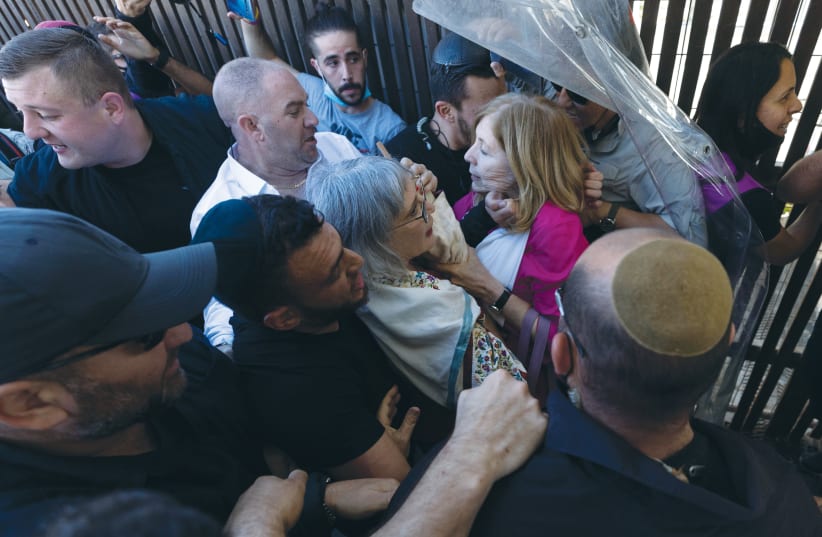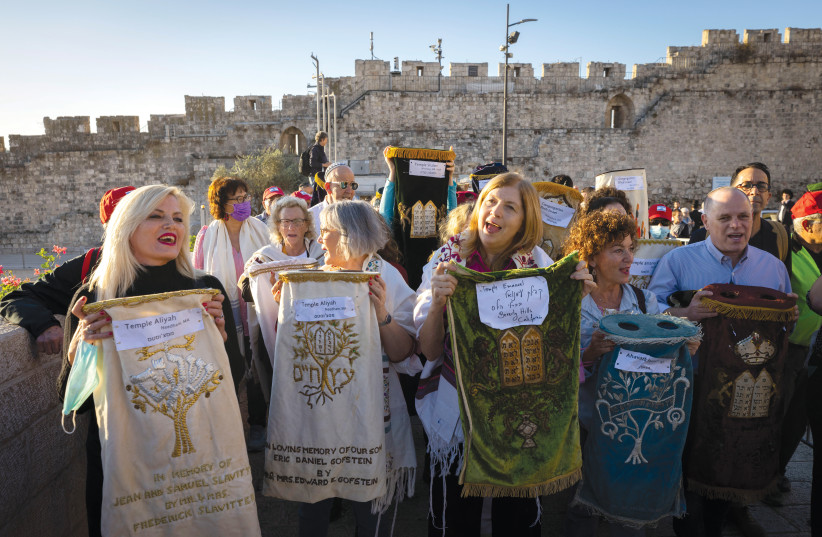In recent weeks, Cabinet Secretary Shalom Shlomo has been holding a series of meetings to bring to fruition the “Kotel Compromise,” a plan that would partition the Western Wall, establish a plaza for mixed prayer, in violation of the millennia-old tradition, and transfer control over parts of the Western Wall (Kotel in Hebrew) to the Israeli Reform and Conservative movements.
Every person of every religion and denomination is welcome at the Western Wall. Like every religious site, it has a tradition and custom that needs to be respected. Yet, the Israeli government is acting under the assumption that it needs to change the Western Wall plaza to repair the rift between Israel and the Diaspora. Over the past several years, liberal movement leadership have consistently sent a message to the Israelis that they represent the majority of world Jewry and their constituents feel left out and slighted by the religious status quo in Israel.
This narrative is patently false, conveniently ignoring the emerging trends and forces in the Diaspora. The Western Wall compromise it fuels is thus not only misguided, but downright dangerous.
Firstly, the Reform and Conservative leadership do not represent Diaspora Jews. While various self-reporting population studies suggest that the liberal movements account for just over 50% of American Jews (some 3-3.5 million people), these numbers are misleading. The site of the World Union for Progressive Judaism, the umbrella organization of the Reform movement, boasts 1.2 million members worldwide. The Conservative movement is estimated to have approximately 600,000 members. The two movements together account for 10% of the global Jewish community – an important minority, but not a representative voice.
Furthermore, both movements are experiencing a rapid implosion, closing a quarter of their synagogues over the past two decades. This is mostly due to the loss of the younger generation. Today, only one in three millennials identify with the liberal movements, as opposed to two out of three in the generation of their grandparents.
Secondly, the religion-and-state issues are not the basis for the rift. Anyone familiar with on-the-ground reality understands that the distancing of certain parts of Diaspora Jewry from Israel is in no way caused by Israel’s policy at the Western Wall or its religious status quo. Rather, it stems from their apparent disconnect to Jewish identity.
A Pew Research Center study shows a clear correlation between the depths of Jewish observance and affinity for Israel. On almost all questions of connection, self-identified Orthodox respondents show a higher degree of connection than the Conservative, the Conservative higher than the Reform, and the Reform higher than the unaffiliated.
NO AMOUNT of policy changes in Israel will bring large swaths of Diaspora Jews closer to Israel. Only a massive investment in Jewish education and identity programming can bring young Diaspora Jews to once again identify with Israel.
Thirdly, the idea that the partitioning of the Western Wall will boost the connection between Diaspora Jewry and Israel is fundamentally false. Close to 60% of American Jews belonging to the liberal movements have never set foot in Israel. Another 20% have visited here once in their lifetime. Moreover, the Pew study shows that of those who self-identify with the Reform movement, 85% visit their own synagogue a few times a year or not all. If the vast majority of those whom the Reform leaders claim to represent cannot be bothered eeither to attend their neighborhood temple nor to make a trip to Israel, it is hard to believe that changes in the prayer tradition at the Western Wall would foster deep emotional ties to the holy land.
Finally, the damage inherent in the deal is enormous. It will drive significant parts of world Jewry away, specifically those communities who have been historically most loyal and invested in Israel. The balkanization of the place so holy and dear for all of us and the violation of the age-old prayer tradition will send a clear message to these communities that the State of Israel has given up on our sacred values and bonds.
As an organization dedicated to promoting Jewish identity and the connection between Israel and the Diaspora, our office has been inundated with emails and calls from Jews from all over the world, requesting guidance in how to notify the Israeli government of their opposition to the partitioning of Western Wall. These voices have led us to start a petition drive and we are expecting to submit hundreds of thousands of letters to the Israeli leaders in the coming weeks.
The continued unity of our people and to the connection between the Jewish communities and Israel is on the line. Not only will the deal do nothing to bring the various Jewish communities together, but on the contrary, it will deepen the rift and distance Jews from Israel and from each other.The Western Wall is the heart of the Jewish people. Despite the differences between us, we are all united around the Western Wall. In front of its stones, we are all inspired by our nation’s millennia-old tradition and history. The partitioning of the Western Wall will eternalize the divisions among the Jewish people, quite literally setting them in stone.
We cannot let that happen. Not on our watch.
The writer is cochairman of Am Echad, an organization that brings together Jewish leaders with the objective of promoting Jewish identity and the connection between Israel and the Diaspora.

